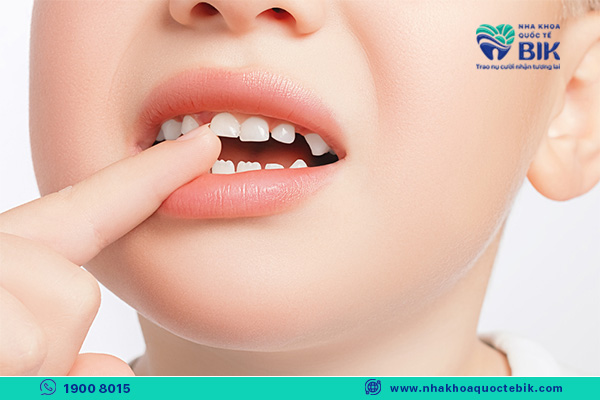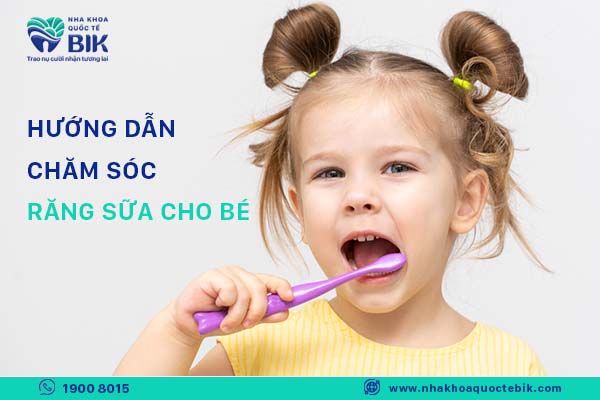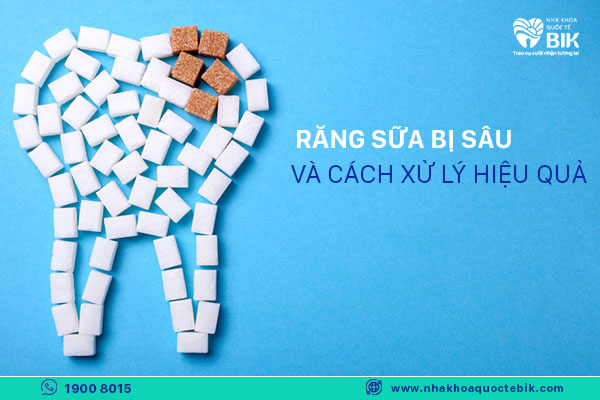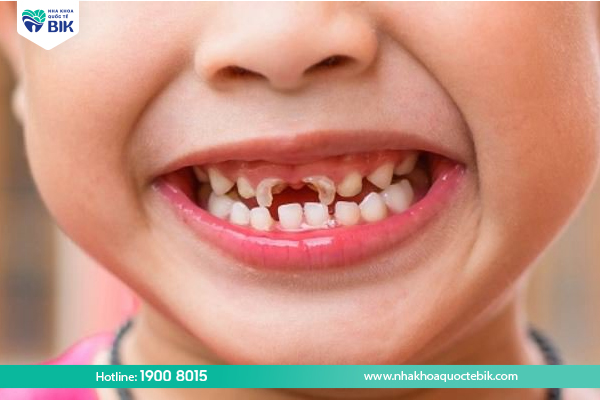Baby tooth decay due to eating candy is a common condition caused by many different reasons. Even though it is only baby teeth, tooth decay will seriously affect the oral health as well as the overall health of the child if not treated promptly. Parents can apply some ways to treat tooth decay at home to relieve the pain and help the child feel more comfortable, but to treat it thoroughly, they still need to go to the dentist.
1. Signs of baby tooth decay due to eating too much candy
Tooth decay due to eating too much candy is a common oral disease that is most common in young children. Tooth decay can cause pain and damage to the hard tissue of the tooth due to bacteria in plaque that attack over time. In some cases, children have severe tooth decay leading to large cavities, tooth discoloration and tooth loss if not treated promptly.
Usually, tooth decay in the early stages does not show many obvious symptoms. Parents will only discover that their child has tooth decay when tiny black holes appear, the gums are swollen, and the teeth are discolored. In addition, there are some other signs of tooth decay such as:
– When eating hard or chewy foods, the tooth will ache.
– Teeth become sensitive and painful when exposed to hot or cold foods such as ice cream, yogurt, ice, hot soup, etc.
– Children have toothaches for no other reason.
– Children’s mouth has an unpleasant odor even after being cleaned.
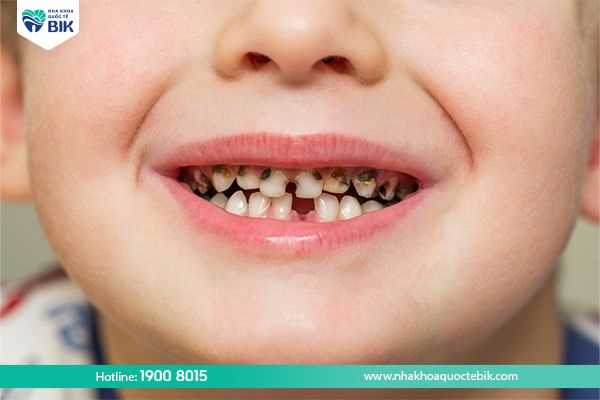
2. Why are children prone to tooth decay when eating candy?
Not only candy, but sweet foods in general can affect the overall health of both adults and children. Candy can come in many forms, from lollipops, hard candies, gummies to chewing gum. All candy contains a significant amount of sugar, which increases the risk of tooth decay. Although sugar is the ingredient that causes tooth decay as people often say, however, bacteria are the real cause of attacking tooth enamel, leading to the formation of cavities on the tooth surface.
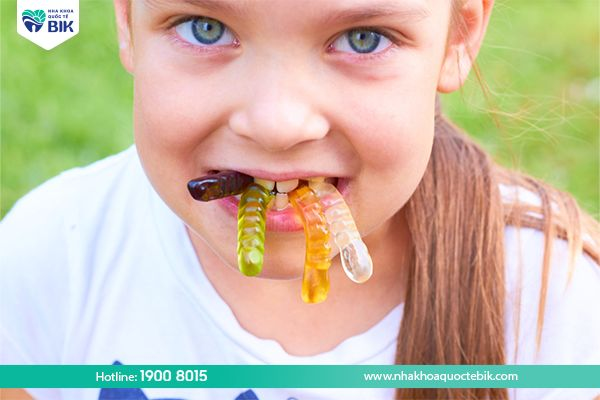
After digesting sugar, a plaque from a mixture of bacteria and saliva can form in the oral cavity. If plaque accumulates over time, bacteria and saliva will cause tooth decay from the process of enamel erosion. Small defects on the teeth are the first stage of tooth decay. In addition, especially in the case of children with tooth decay, it is also due to the following reasons:
– Children’s teeth under 7 years old are often baby teeth that are not yet fully developed in terms of structure. The ingredients in candy easily stick to the tooth surface, making it difficult to clean, damaging the enamel. Therefore, teeth are very susceptible to the negative effects of bacteria that cause oral diseases.
– Children’s tooth enamel is often quite thin and weaker than permanent teeth in adults. Therefore, children’s teeth are easily sensitive and not strong enough to resist bacterial attacks.
– In addition, many young children do not have the habit of proper oral hygiene, which creates conditions for bacteria to grow and develop more strongly, attacking tooth enamel and causing tooth decay.
3. What effects does tooth decay have on children?
If tooth decay is not treated promptly, it will lead to the following effects:
3.1. Toothache
In the early stages of tooth decay, children may not feel pain or toothache, but when the cavities become larger and even reach the pulp, children will have to face severe and extremely uncomfortable pain.
This affects the daily activities as well as the spirit of the child. From there, children become irritable, difficult and lazy to communicate with people when the decayed tooth still brings pain every day.
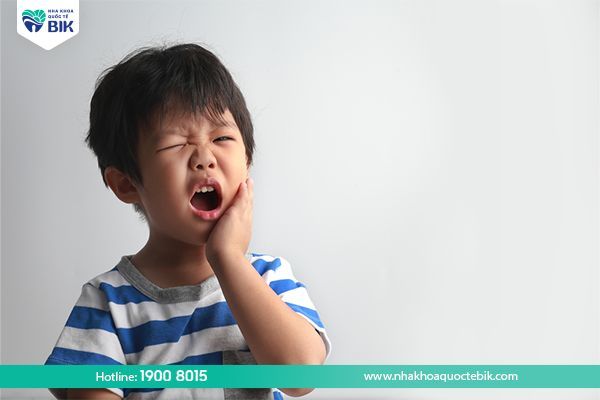
3.2. Damaged tooth pulp
If tooth decay is not detected and treated early, the decay can spread to the tooth pulp, causing pulpitis. In severe cases of pulpitis, the doctor may recommend tooth extraction to ensure that the adjacent teeth are not affected.
It can be seen that even though it is a baby tooth, tooth decay in children due to eating too much candy can also cause serious effects on the child’s health. Therefore, parents should not be subjective about these oral diseases but should take their children to the dentist to promptly implement treatment measures according to the doctor’s instructions.
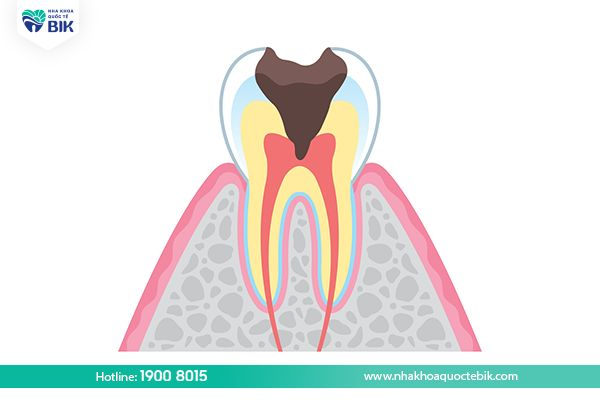
3.3. Affects digestion
Tooth decay creates a feeling of constant pain that will affect the chewing process. Tooth decay will no longer be able to chew and crush food, causing the stomach to work too hard to digest food. This can affect the digestive system if it happens for a long time, leading to diseases such as stomach pain, gastritis, etc.
4. How to treat tooth decay in children at home
To relieve pain and help children feel more comfortable at home, you can apply some of the following methods:
4.1. Use salt water
Gargle and rinse your mouth with salt water to disinfect, reduce pain and inflammation caused by tooth decay. However, parents should use saline instead of homemade salt water to ensure the safety of their children’s oral health.
To kill bacteria and prevent children from eating candy and getting tooth decay, parents should let their children rinse their mouths with salt water after every meal, before going to bed and in the morning after waking up.
4.2. Use fresh lemon juice
Fresh lemon juice will have a mild antiseptic effect as well as reduce the pain when children have tooth decay due to eating too much candy. Lemon contains natural acid that plays an important role in preventing and limiting the spread of bacteria that cause tooth decay. However, rinsing your mouth with fresh lemon should only be done about 2 times/week to avoid eroding the enamel of your child’s teeth.

In addition, instead of giving children soft drinks containing a lot of sugar which is not good for their health, parents can also give their children diluted lemon juice every day as a soft drink. It both supports health and helps teeth become stronger.
4.3. Gargle with mango peel water
Using mango peel to treat tooth decay is probably still unfamiliar to many people. Parents only need to prepare about 3 pieces of chopped mango peel and boil them with 3 bowls of filtered water. Wait until the water is reduced by 1/4, turn off the stove, let it cool and can be stored in the refrigerator.
Use the mango peel water obtained as above mixed with 1/2 cup of alcohol for your baby to rinse his mouth every morning when brushing his teeth and in the evening before going to bed. The discomfort and pain caused by tooth decay will be relieved after a few days of application.

5. Treating tooth decay in children at the dentist
When a child’s teeth have begun to have large cavities, parents need to take their child to a reputable dental facility for examination and the best treatment plan:
5.1. In case of mild tooth decay in children
Usually, in cases where the teeth only have tiny black spots, the doctor will perform enamel remineralization. The doctor will prescribe the child to use tooth decay medications such as phosphate, calcium, fluoride to fill the surface of the decayed tooth gently and simply without causing pain to the child. At this time, the child’s teeth are still preserved to the maximum extent, without affecting the child’s oral health.
5.2. In case of severe tooth decay in children
When the decay has spread and formed black holes causing chipped teeth and the child often feels severe pain, the doctor must intervene with dental instruments to check whether the tooth decay has spread to the pulp. If the pulp is infected, endodontic treatment is needed first and then the tooth is filled.
In some cases, tooth decay causes alveolar abscess and severe pulpitis that cannot be treated, the doctor must remove the tooth to prevent the cavity from spreading and affecting the adjacent teeth and to avoid complications for the permanent teeth that grow later.
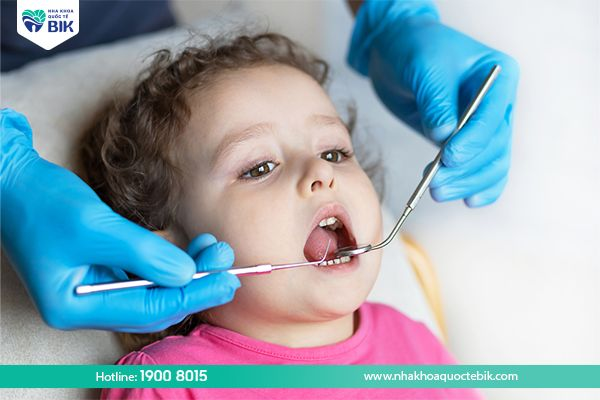
6. Effective prevention of tooth decay in children when eating candy
To prevent tooth decay in children when eating candy, parents should pay attention to implementing the following preventive measures:
6.1. Check tooth sensitivity
Understanding tooth sensitivity is the basis for doctors to determine effective tooth decay treatment methods. Currently, there are many clinics that provide services to test the sensitivity of bacteria that cause tooth decay. If this index is high, children eating candy will make their teeth more susceptible to acid, leading to a higher risk of tooth decay than those with low indexes.
6.2. Limit children’s snacking
An unreasonable diet, consuming many acidic foods such as sugar can increase the pH concentration in the oral cavity. This creates favorable conditions for cavity-causing bacteria to thrive. In addition, acid can erode minerals from tooth enamel, creating conditions for bacteria to attack strongly.
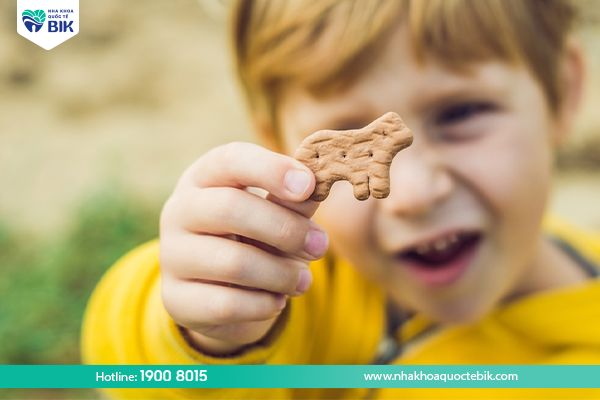
Note that each healthy set of teeth can only neutralize acid 4-5 times/day. Therefore, if children snack and eat candy regularly, saliva will not be able to achieve a natural balance. As a result, beneficial bacteria will die, acid-loving bacteria will have conditions to grow and damage tooth enamel.
6.3. Develop oral hygiene habits
To protect your child’s teeth from bacteria that cause tooth decay, parents need to maintain an oral hygiene habit for their child after each meal. Remind your child to brush their teeth, at least 30 minutes after eating to remove food particles left in the mouth, preventing bacteria from growing.
In addition, parents also need to remind their children to brush their teeth thoroughly every morning when they wake up and every evening before going to bed to protect their teeth to the maximum.

6.4. Do not eat before going to bed
Eating late at night before going to bed is a big threat to children’s teeth. The reason is that at night, the body’s saliva secretion is greatly reduced, so it is no longer enough to protect teeth from the attack of bacteria that cause tooth decay. Therefore, parents should feed their children dinner early so that the oral cavity has time to adjust, at the latest 30 minutes before going to bed.
So tooth decay in children who eat candy is a very common condition today when children eat too many snacks and candies without being instructed on proper oral hygiene. To avoid serious effects on overall health, parents should take their children to a reputable dentist for examination, to determine the specific condition of tooth decay, and then carry out appropriate treatment measures as prescribed by the doctor.


